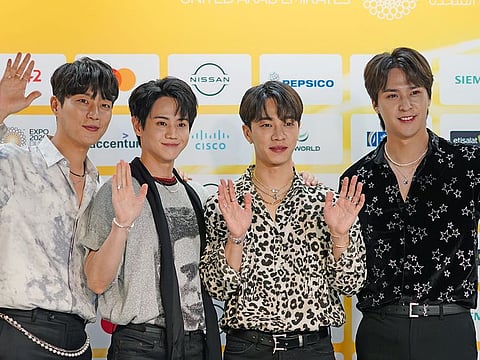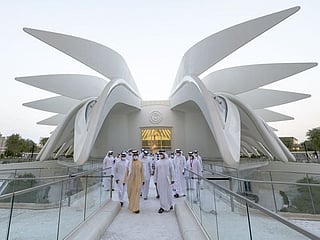Expo 2020 Dubai: K-pop veterans Highlight are a steady force 12 years into career
In an industry rife with new faces and new ensembles, Highlight are here to stay

Dubai: Yoon Doojoon, Yang Yoseob, Lee Gikwang and Son Dongwoon shine spectacularly as they file into the press conference at Expo 2020, donning a coordinated stage wardrobe of blacks and whites. Greetings are delivered with synchronised bows and easy smiles. Though it marks their first time in Dubai, the upcoming show is far from their first rodeo.
When international concerts from Berlin to Singapore make up the most of your 12-year career, you would, too, trade playful jibes with your bandmates in the presence foreign media.
Before the K-pop quartet came under their new name Highlight, there was Beast. From 2009 to 2016, the then six-piece sensation were seen wearing heavy kohl shuffling their feet to widely popular track ‘Fiction’ and breaking out into hip-hop moves in ‘Beautiful’, all carrying the nostalgic hallmarks of popular second-generation Korean releases – dancing in mysterious tunnels, under flashing lights, yet singing irresistible tunes that helped put K-pop on the world map.
“Back then we actively performed abroad quite often, the kind of stages that introduced K-pop to the audience. And now with [fourth-generation] junior groups staging cool performances, so many people around the world have become fans. So as a member of the industry, I feel pretty proud,” Yoseob told Gulf News in an interview at the conference, a few hours prior to Highlight’s concert at the world fair on Friday.
Competition runs high within said industry. ‘Comebacks’ or album drops are the most anticipated event for fans and their artists alike – it spells a new era of live performances on weekly music shows with increased appearances on variety TV. But above all, there’s the renewed opportunity for fans to stream the music fiercely and rack up physical copies, much like investing in raffle tickets, to put their group’s name high on charts.
Many would argue that this is a recent phenomenon, a product of idol music which has been rapidly evolving since the likes of first Korean pop groups in the 1990s – Seo Taiji and Boys, H.O.T., Fin.K.L. and S.E.S. With the following generation, which includes Highlight, K-pop’s catchy hooks and singers’ boy/girl next door image quickly crossed borders in the late 2000s.
Fans of the olden days might jokingly ask to be cut a ‘veteran discount’, but extant long-running ensembles are beginning to feel the heat. Jung Eunji, a member of well-known 2011 act Apink, is famously quoted saying on a talk show that senior groups with long years of experience get treated like ‘second-hand idols’.
Gikwang notes the changes before and after his mandatory military service, as he answers another Gulf News question: “I think a lot has changed from the time we enlisted. K-pop will continue to become global with more and more artists working hard to put out quality content. I had the chance to work with fourth-generation idols quite often and noticed that, compared to our rookie days, they seem to be more adept at upskilling. We as seniors can learn a lot from them.”
But young artists must see a hopeful future for themselves in Highlight’s story. In late 2016, the group collectively separated from their first agency, Cube Entertainment, to set up an independent label Around Us. This rare feat came at a steep price: Highlight had to give up the rights to their former name, one that had defined them for the past eight years.
It’s hard to stay grounded at a time when past groups have been increasingly announcing the end of their performing careers. When SHINee, 2PM and then Highlight dropped their successive albums this year, so-called veteran fans rejoiced. Tenacious artistry could hold the fort down for newcomers in K-pop, if not becoming a beacon of hope for those who’d like to resume stardom.
If their latest title track is any indication to go by, then Highlight are “still here, it’s not the end”.
Sign up for the Daily Briefing
Get the latest news and updates straight to your inbox









